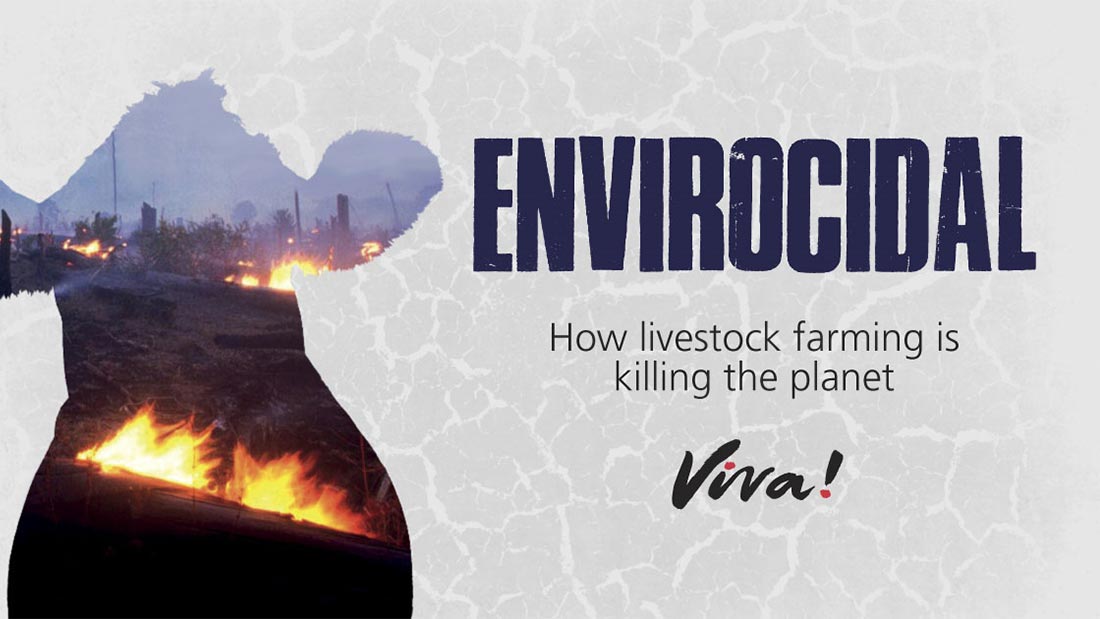New Report Highlights the Devastating Environmental Impact of Livestock Farming

New Report Highlights the Devastating Environmental Impact of Livestock Farming
Animal welfare charity Viva! has published a new report detailing the shocking environmental impact of the livestock industry.
ENVIROCIDAL – How Livestock Farming is Killing the Planet reveals the scale of global warming and predicts the devastating effects livestock farming will have on the environment if the global consumption of animal products continues at the same rate. The report investigates all aspects of climate change, from global warming to overfishing, loss of biodiversity, land and water use, and addresses common misconceptions about soya and palm oil production.
The environmental impact of livestock farming is becoming increasingly well-known. The United Nations’ Intergovernmental Panel on Climate Change (IPCC) have issued a stark warning that world governments must take “rapid, far-reaching and unprecedented changes” to avoid disastrous levels of global warming, concluding that we need serious change at every level of society which includes a move towards “less resource-intensive diets”.
The meat and dairy industry is one of the main contributors to global warming and is the single biggest cause of air pollution in Europe – contributing more greenhouse gases than residential energy or power generation. As food production continues to expand to meet the world’s growing appetite for meat, emissions from livestock farming will continue to rise.
ENVIROCIDAL describes how the production of meat and dairy food is having have a disastrous impact on biodiversity through overgrazing, deforestation, land degradation and desertification – each driven by the expansion of livestock farming and intensive production of animal feed. One in nine people in the world are undernourished yet we feed a third of our global crop production to animals. Growing food for human consumption, without first feeding it to animals, could feed an additional four billion people.
The new report also highlights the alarming rise in antibiotic resistance, a direct consequence of the inappropriate use of antibiotics in livestock farming. Many farmers routinely use antibiotics to promote growth and prevent disease in healthy animals. In some countries, a huge proportion of antibiotics which are medically important to humans are used this way and are losing their effectiveness.
There is clear need for strategic, integrated policies in our approach to animal agriculture and forestry. The most effective method to reduce greenhouse gas emissions is to reduce our reliance on animal products. A global switch to diets that rely less on meat and more on fruit and vegetables could save eight million lives by 2050 and reduce greenhouse gas emissions by two thirds.
Dr. Justine Butler, Viva! Senior Researcher and author of ENVIROCIDAL, said:
“Global warming isn’t a prediction, it’s happening right now. If these warnings are ignored, climate change will lead to a whole new range of health risks – from infectious disease outbreaks to water shortages, drought and mass extinctions. We must take urgent action to avert an environmental disaster.
The overriding message is clear: changing your diet is the easiest way to make an effective difference. It is common knowledge that old gas-guzzling cars are wasteful and inefficient, it’s time that meat and dairy production was viewed in the same way. Using energy efficient lightbulbs or switching to an electric car is simply not enough if people continue eating steak and burgers. The science is unanimous, the best change we can each make is to stop eating animals.”
ENDS information:
Notes to Editors
For more information about this media release, contact Roisin McAuley, Viva! PR & Marketing Manager on roisin@viva.org.uk or call 0117 944 1000.
Access the full report here: www.viva.org.uk/envirocidal
